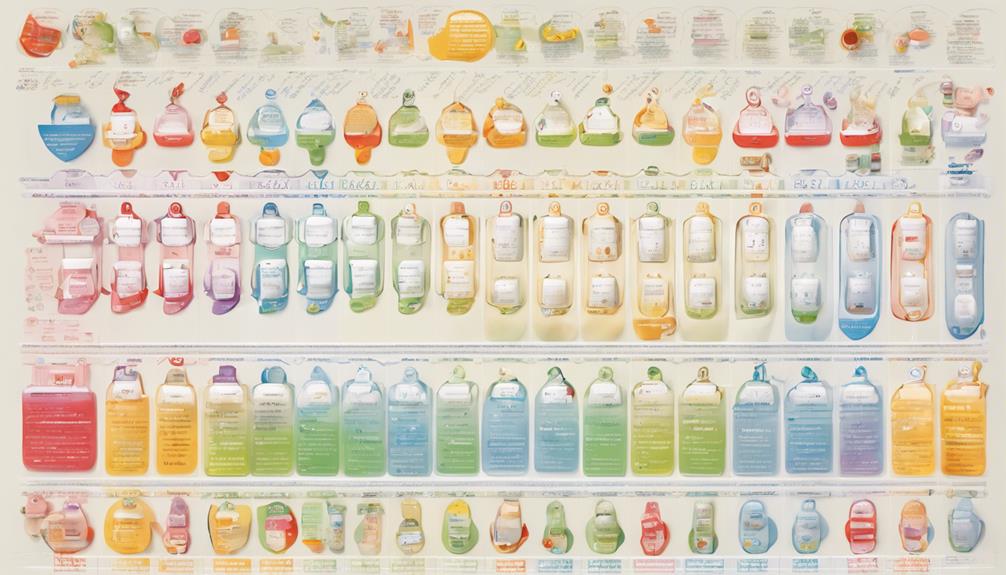As we embark on the intricate process of creating a feeding schedule for a 2-month-old baby who is being fed formula, we begin to recognize the unique hunger cues of our little ones. Although it may be challenging at first, striking a balance between responding to feeding cues and sticking to a regular routine can result in a harmonious combination of nourishment and growth.
However, in this delicate dance of feeding schedules, one must consider various factors to guarantee the well-being of our tiny charges. Stay tuned as we uncover the key elements that will orchestrate a successful feeding regimen for your 2-month-old.
Key Takeaways
- Aim for 4-5 ounces of formula every 3-4 hours to meet nutritional needs.
- Establish a structured feeding schedule to ensure regular and adequate feedings.
- Monitor weight gain and diaper output for baby's growth and health.
- Respond promptly to hunger cues and maintain a consistent feeding routine for a happy baby.
Establishing Feeding Frequency and Amounts
When establishing the feeding frequency and amounts for a 2-month-old formula-fed baby, it's essential to observe hunger cues and adjust feeding times accordingly.
At this age, a 2-month-old baby typically consumes 4-5 ounces of formula per feeding, with a feeding frequency of 6-8 times a day, spaced out every 3-4 hours.
It's important to pay attention to hunger cues such as rooting, sucking on hands, or fussiness to determine when your baby needs to eat. Babies may also go through growth spurts, requiring more frequent feedings or larger amounts of formula.
While having a feeding schedule can provide a helpful structure, it's important to remain flexible to meet your baby's individual needs. Adjusting feeding amounts based on your baby's appetite and growth patterns ensures they receive adequate nourishment during this crucial stage of development.
Structuring a 2-Month-Old Feeding Routine

To establish a structured feeding routine for a 2-month-old baby, it is important to contemplate the baby's typical consumption of 4-5 ounces of formula per feeding and aim for feedings every 3-4 hours during the day. Responding to hunger cues is key, as babies may need to feed more frequently or less predictably. Nighttime feedings are common at this age, so be prepared for night feeds as well. Monitoring weight gain and diaper output can help make sure your baby is receiving adequate nutrition. Here's a helpful guide to structuring a 2-month-old feeding routine:
| Time | Feeding Amount (oz) | Notes |
|---|---|---|
| 7:00 am | 4-5 | Start of the day |
| 10:00 am | 4-5 | Mid-morning feed |
| 1:00 pm | 4-5 | Afternoon feed |
| 4:00 pm | 4-5 | Late afternoon feed |
| 7:00 pm | 4-5 | Evening feed |
Tips for a Smooth Feeding Schedule
For a smooth feeding schedule with your 2-month-old, maintaining consistency in feeding times is important. Here are some tips to help you establish a healthy and effective feeding routine:
- Respond to Feeding Cues: Pay attention to your baby's hunger cues such as rooting, sucking on fists, or increased alertness. By responding promptly to these cues, you can prevent your baby from becoming overly hungry or fussy.
- Establish Predictable Patterns: Try to create a feeding schedule that follows a similar pattern each day. This predictability can help your baby feel secure and make it easier for you to anticipate their needs.
- Adjust to Fullness Cues: Just as recognizing hunger cues, being attentive to your baby's fullness cues is equally important. Look for signs like turning away from the bottle or becoming disinterested in feeding to know when your baby has had enough.
Monitoring Baby's Nutritional Needs
To guarantee your 2-month-old is receiving adequate nutrition, closely monitoring their feeding habits and developmental indicators is vital. At this age, formula-fed babies typically consume around 4-5 ounces per feeding. It's important to track your baby's weight gain and growth to make sure they're getting the right amount of nutrients. Additionally, observing the number of wet diapers can help indicate if your baby is adequately hydrated from the formula.
Responding promptly to your baby's hunger cues and adjusting the feeding schedule accordingly is key to meeting their individual needs. If you have any concerns about your baby's feeding schedule or nutritional intake, consulting with a pediatrician is recommended.
Ensuring a Healthy Feeding Environment
Maintaining a clean and sanitized feeding area is essential for preventing contamination and ensuring a healthy environment for formula feeding your baby. To create a top-notch feeding space, consider the following:
- Proper Hygiene: Always wash your hands thoroughly before preparing formula to eliminate any potential harmful bacteria that could contaminate your baby's food.
- Sterilized Bottles: Make sure that the bottles and nipples used for feeding are properly sterilized before each use to prevent any bacterial growth that could harm your baby's health.
- Storage Guidelines: Store formula in a cool, dry place away from direct sunlight to maintain its quality. Additionally, follow the recommended storage guidelines for prepared formula to prevent spoilage and guarantee your baby receives the necessary nutrients.
Frequently Asked Questions
How Often Should a 2 Month Old Eat When on Formula?
We feed our 2-month-old on formula every 3-4 hours, giving around 4-5 ounces per feeding. Typically, they have about 5-6 feedings in a day. It's crucial to watch for hunger cues and adjust based on individual needs.
What Is the Ideal Feeding Schedule for a 2 Month Old Baby?
Feeding a 2-month-old involves offering nourishment every 3 to 4 hours, typically 4 to 5 ounces per serving. Our experience shows babies usually enjoy 5-6 meals daily. Recognizing hunger cues like rooting is important.
How Do I Set a Routine for My 2 Month Old?
We establish routines for our 2-month-olds by observing their cues for hunger, sleep, and play. Following their natural rhythms guarantees peak growth and development. Consulting with a pediatrician provides personalized guidance for setting up a routine that fits our baby's needs.
How Do I Make a Feeding Schedule for My Baby?
We found setting a feeding schedule for our baby involved observing hunger cues and adapting as needed. It's essential to track feedings, be responsive to needs, and consult our pediatrician. Flexibility is key for a happy, nourished baby.
Conclusion
To sum up, creating a 2-month-old formula feeding schedule can provide structure and guidance for parents as they navigate their baby's feeding needs.
Did you know that by this age, babies typically consume around 24-32 ounces of formula per day?
Monitoring feeding cues, adjusting schedules as needed, and prioritizing the baby's nutritional needs for best growth and development are important.
Remember, flexibility and responsiveness are key when establishing a feeding routine that works best for both baby and caregiver.










